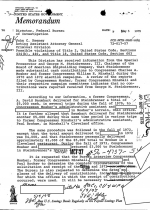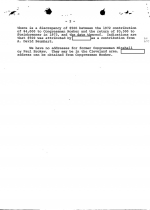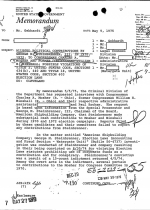FBI Files Reveal Steinbrenner Was A Snitch
Told probers of unreported cash donations to pols

View Document
DECEMBER 23--George Steinbrenner was a snitch.
That is the major revelation found in investigative files on the late New York Yankess owner that were released today by the FBI.
The 420 pages, made public in response to Freedom of Information Act requests, primarily cover the federal investigation that ended with  Steinbrenner’s August 1974 felony conviction for making illegal contributions to Richard Nixon’s reelection campaign.
Steinbrenner’s August 1974 felony conviction for making illegal contributions to Richard Nixon’s reelection campaign.
While Watergate Special Prosecution Force documents (previously published here) indicated that Steinbrenner’s lawyer dangled the businessman’s cooperation as part of a possible plea deal, the FBI files disclose who The Boss subsequently fingered.
In a May 5, 1975 memo to FBI Director Clarence Kelley, a Department of Justice official reported that Steinbrenner had admitted making “substantial cash contributions” to a pair of Ohio congressmen during the 1970 and 1972 election cycles. The prosecutor noted that a review of disclosure reports files by the Republican representatives, Wiliam Minshall and Charles Mosher, “indicates that no contributions were reported received from George M. Steinbrenner, III.”
The cash contributions totaled about $15,000, with most of the money being delivered by a Steinbrenner intermediary to the Ohio district offices of Minshall and Mosher. However, Steinbrenner told investigators that he “personally delivered approximately $1000” to a Minshall aide at a Cleveland restaurant.
Days after Kelley received the DOJ memo, the FBI opened a criminal investigation. In a May 9 internal memo, a bureau official (whose name has been redacted) noted that “Steinbrenner has alleged cash was delivered on several occasions in 1970 and 1972 to the Ohio offices of each of these two candidates.”
The FBI probe of Steinbrenner’s allegations included interviews with Mosher--whose district included Lorain, home to Steinbrenner’s American Ship Building Company--and several other individuals. Minshall, records show, refused to speak with FBI agents. At the time, he had just retired from Congress, departing as the GOP’s ranking member on a powerful House Appropriations subcommittee dealing with defense and transportation funding.
The criminal investigation triggered by Steinbrenner’s information ended without charges being filed. At the probe’s outset, one FBI memo noted that federal prosecutors were aware that “the Statute of Limitations has already run on some of the possible violations,” but that government lawyers thought “there is always the possibility of establishing a continuing conspiracy.” (4 pages)










Comments (3)